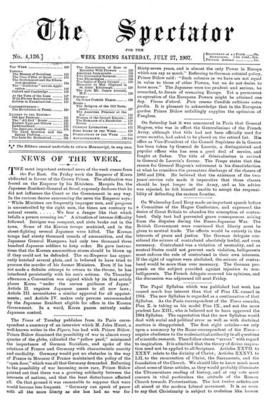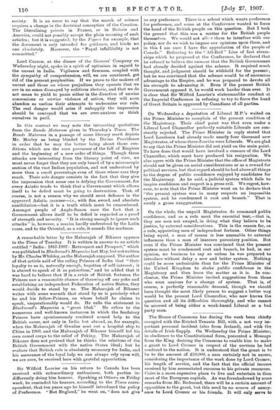The . Papal Syllabus which was published last week has
caused much less interest than that of Pius IX. caused in 1864. The new Syllabus is regarded as a continuation of that Syllabus. As the Paris correspondent of the Times remarks, Pius X. is taking as his model Pius IX., and not the more prudent Leo XIII., who is believed not to have approved the 1864 Syllabus. The expectation that the new Syllabus would deal with social and political error as well as with doctrinal matters is disappointed. The first eight articles—we rely upon a summary by the Rome correspondent of the Times— require obedience to the ecclesiastical authority in all questions of scientific research. Then follow eleven " errors " with regard to inspiration. It is admitted that the theory of divine inspira- tion need not be applied to all Scripture. Articles XXVII. to XXXV. relate to the divinity of Christ ; Articles XXXVI. to LIL to the resurrection of Christ, the Sacraments, and the foundation of the Church. We should like to know much more about some of these articles, as they would probably illuminate the Ultramontane reading of history, and at any rate must concern in vital particulars the attitude of the Roman Church towards Protestantism. The last twelve articles are all aimed at the modern Liberal movement. It is an error to say that Christianity is subject to evolution like human
society. It is an error to say that the march of science requires a change in the doctrinal conception of the Creation. The liberalising priests in France, or in Britain and America, could not possibly accept the plain meaning of such articles ; but it is suggested, by the Figaro for example, that tbe document is only intended for guidance, and binds no one absolutely. Moreover, the "Papal infallibility is not committed."







































